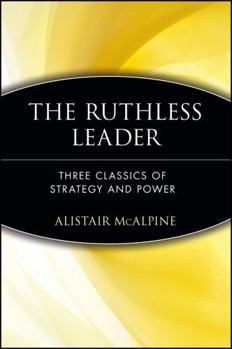The Ruthless Leader: Three Classics of Strategy and Power
"The Ruthless Leader" ist eine Kombination aus drei pr?gnanten Klassikern: Niccolo Machiavelli's "Der F?rst", Alistair McAlpines "The Servant" und Sun Tzus "Die Kunst des Krieges". Hier lernen Sie, wie sie in einer Gesch?ftswelt ?berleben und erfolgreich sind, die gepr?gt ist von Mi trauen und Neid, von strategischen Allianzen und Fehlinformation. W?hrend "Der F?rst" und "Die Kunst des Krieges" Anleitungen f?r den "Herrscher oder Befehlshaber" - den...
Format:Paperback
Language:English
ISBN:B006IML80U
ISBN13:9780471372479
Release Date:March 2000
Publisher:Wiley
Length:272 Pages
Weight:1.28 lbs.
Dimensions:0.7" x 6.2" x 9.0"
Customer Reviews
3 ratings
highly interesting, moderately helpful
Published by Thriftbooks.com User , 23 years ago
This three-in-one collection is indeed great value for money, and it provides many valuable points in regard to other human beings. It is quite interesting to read the works of all three theorists as they really open the eye to how much mankind has painted the false image of constant forward evolution - man has been and always will be of the same character. This is perhaps the most valuable lesson of the book. However, McAlpine as Editor has left no hint of how to apply these rules and methods that Sun Tzu, Machievelli and, to a lesser extent, the Editor himself, so delicately developed to modern life. The introduction and its lack of proper juxtapositioning of historical circumstances is the only real setback of the book(s). Otherwise, an interesting - though difficult - read.
The Vigilant Leader
Published by Thriftbooks.com User , 23 years ago
Ruthless Leader is a compilation of three separate works `The Prince' by Niccolo Machiavelli, `The Servant' by Alistair McAlpine and `The Art of War' by Sun Tzu. All three works have indisputably immense knowledge of their surroundings and the ploys to gain advantage over an adversary. `The Prince' teaches one the politics of holding on to power. For prince, politics is war and any deceit and chicanery is possible. According to this principle victory must be ruthlessly sought; in the end no matter how treacherous, justifies the means. As the following passage proves "How honorable is it for a prince to keep his word and act rather with integrity than collusion, I suppose everyone understands: nevertheless, experience has shown in our times that those princes who have not pinned themselves up to that punctuality and preciseness have done great things, and by their cunning and subtlety not only circumvented and darted the brains of those with whom they had to deal, but have overcome and been too hard for those who have been so superstitiously exact". In this belief a state must be retained by cunning, shrewdness, deception and continued preparation for war.In `The Servant', the attendant has to believe in the idea - a philosophy developed by the prince as a leader by which the state is ruled. The servant on the back stage through diplomacy spreads the idea to gain consensus. The Servant needs to be self-motivated and serves the prince out of loyalty to the idea rather than loyalty to the prince himself.In the `Art of War' the underlying tone is discipline. Discipline via fear is however useful only up to a point. There must be a motivating force for all people who aspire to succeed, whether in the field of business, politics, administration, government or warfare. Wars cannot be won by just mere strength but it is on a conglomeration of factors, which need to be accounted. Sun Tzu emphasizes the need to take the moral of oneself and its enemy, the environment and other barriers into consideration. The moral strength and intellectual faculty of men were decisive in war, and that if these were applied war could be waged with certain success. Never to be undertaken thoughtlessly or recklessly, war was to be preceded by measures designed to make it easy to win. The master conqueror frustrates his enemy plans and breaks his alliances; he creates cleavages between the sovereign and minister, superior and inferiors, commanders and subordinates. His spies and agents are active everywhere, gathering information, sowing dissention and nurturing subversion. The enemy needs to be isolated and demoralized and his will to resist broken, thus without battle his army is conquered his cities taken and his state overthrown.In Ruthless Leader all three writers are very vigilant and keen observers on human psychology. A highly recommended book for all.
3 Classics in 1 Book, Great Value
Published by Thriftbooks.com User , 24 years ago
Nicolo Machiavelli's The Prince is a fifteenth-century Florentine philosopher-satirist's essay on how to be an effective potentate. Alistair McAlpine's The Servant contains political advice from a Thatcherite politician whilst Sun Tzu's The Art of War is a fifth-century B.C. Chinese general's treatise on military strategy. The combination of these three works makes a devastating statement about human nature. Each was written by an undeniably perceptive observer of humanity, and each offers unvarnished truths about human nature, especially as it expresses itself in an organisation-whether it be political, military, or corporate. Each classic portrays timeless principles for exploiting human foibles in order to promote one's own self-interest, while at the same time doing what is best for the organisational bottom line.They are unrivalled sources for anyone who seeks to understand the elaborate, often brutal, rituals of strategic conduct in any day and age. As such, these texts contain valuable lessons to a businessman trying to get ahead in today's volatile, globalised business world. Call them ruthless or simply pragmatic, but these classics comprise an indispensable survival guide for anyone who wants to swim with the sharks without being eaten alive.






